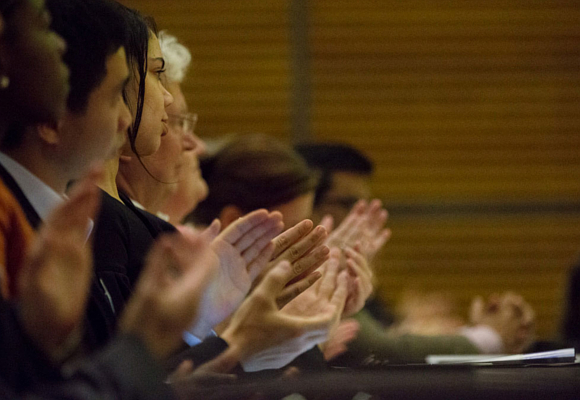Humans can beat machines
Many more occupations now at risk of computerisation, but technology still no substitute for perception, creativity and social skills

The workers of the future will have to become «more human» in order to compete with technology that will increasingly challenge human labour in a range of cognitive as well as manual tasks. At the same time, we will have to redefine our measures of «productivity» and «work» if we are not to collapse under the pressures of infinite devices and infinite data vying for our finite time and attention. The fourteenth Silicon Valley Comes to Oxford, on 17th – 18th May 2015, will discuss the impacts and challenges of augmented humanity on the workplace and employment in the future.
‘Computers were initially used to carry out routine tasks involving explicit rule-based activities, which tended to be viewed as freeing people from mundane and repetitive work,’ says Michael Osborne, Associate Professor, University of Oxford, and Co-Director, Oxford Martin Programme on Technology and Employment, who will be presenting on Technology at Work: The Future of Employment. ‘But big data means that algorithms from Machine Learning can now easily substitute for labour in a much wider range of non-routine tasks, from legal writing to truck-driving. In addition, advanced robots are gaining enhanced senses and dexterity, allowing them to perform more complex manual tasks.’

Professor Osborne will talk about his research predicting the jobs and occupations most at risk from computerisation in the future, and also about the new jobs and emerging industries that are likely to replace them. Fraud detection, legal research, healthcare diagnostics, telemarketing and reception duties are all at risk, he will explain, while wind energy engineers, solar energy installation managers, nanotechnology engineers, and informatics nurse specialists are likely to be in demand – as well as Zumba instructors and beach body coaches.
‘Tasks that are non-susceptible to computerisation require creative and social intelligence,’ he says. ‘For workers to win the race against technology, therefore, they will have to acquire creative and social skills – forcing a revaluation of our attitudes to education and development.’

Dave Coplin, Chief Envisioning Officer for Microsoft UK, will talk about The Rise of the Humans: How to Outsmart the Digital Deluge. He argues that, while the computerisation of routine tasks was meant to free up our time for leisure and for more complex and interesting work, the opposite has happened. We are drowning in a «deluge of data» that can keep us from doing meaningful, real work. In addition, our obsession with «productivity» and the «rate of output» means that ‘in a world defined by its processes and not its outcomes, working smarter is not an option and the only feasible alternative is simply to work harder.’
Phil Libin, CEO of Evernote, may disagree. He believes that companies need to keep up with the tools and technologies that result in a more productive, efficient and plugged-in work force. He can talk about how A.I. (or Augmented Intelligence) technology can ensure that employees feel plugged in and connected, whether they’re in a start-up or larger organisation.
